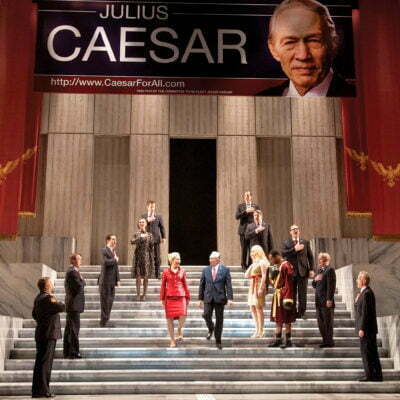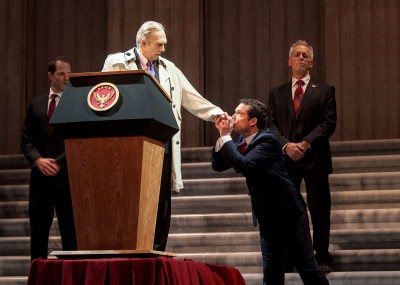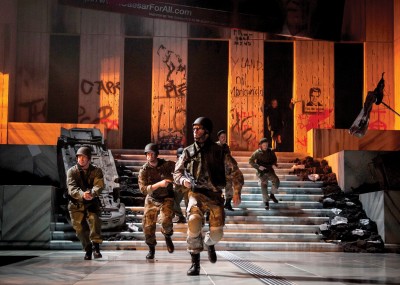Julius Caesar

Directed by Jonathan Munby
Produced by the Chicago Shakespeare Theater
Starring David Darlow, Dion Johnstone, Jason Kolotouros, John Light, David Lively, Barbara E. Robertson and Larry Yando
Despite all the pomp and majesty, there’s something lackluster about CST’s Julius Caesar.
The venerable Dr. Samuel Johnson thought Shakespeare’s Julius Caesar “cold and unaffecting,” and little in director Jonathan Munby’s new production at Chicago Shakespeare Theater convinces me otherwise. To be fair, every production of Julius Caesar suffers from the same handicap. For whatever reason, Shakespeare chose not to provide the necessary foreground for that most special of relationships between Caesar and his assassin, Marcus Brutus. How is it, after all, that Marc Antony can call Brutus “Caesar’s angel”? Are we ever afforded a reason for it beyond that of obligatory patriotism? Contemporaries of Shakespeare—at least those well-versed in their Suetonius and Plutarch—might well have known the rumors which suggested Brutus was actually Caesar’s son. But this filial connection goes largely unexplored in Shakespeare’s play, his two central characters sharing only a few entirely unremarkable exchanges. By consequence, Brutus approaches the solemn act of regicide (maybe even patricide) with a strangely detached—even intellectual—emotional disinvestment. In short, the most critical relationship in the play is even for Shakespeare something of a nonstarter, and the whole tragedy unfolds as something unduly austere—as though the very fabric of the play were hand cut from a piece of Carrara marble.
Most modern productions tend to compensate for this lack of strong emotional foregrounding by invoking highly charged topical themes. Julius Caesar in Bosnia. In West Africa. In Syria. In the Italy of Mussolini. Indeed, wherever there lingers the encroaching threats of fascism or totalitarianism, a production of Julius Caesar usually follows. Which is why perhaps CST’s most recent mounting of the play feels a tad flat and lackluster. Choosing to set the action of the play in the milieu of contemporary American politics, Mr. Munby’s Cesar (here played by David Darlow) makes his first appearance beneath an enormous banner supporting his supposed “re-election.” Replete with the same slick bold colors and brand-name imaging so characteristic of presidential campaigns in the age of Obama, it suggests a Cesar whose power is contingent on the effective whitewashing of a good PR team (aided, of course, by the beneficence of a well-funded Super PAC).
American politicians are sold to us as though they were tubes of toothpaste, and Mr. Munby’s Cesar looks to be no different. But the whole thing feels a touch too ironic, too cheeky, as we soon suspect the image of Cesar—like that of all great American politicians—to be infinitely more impressive than the man himself. Yet if Brutus is to enact a genuine tragedy, then Cesar must be no less than he claims: “…constant as the northern star,/ Of whose true-fix’d and resting quality/ There is no fellow in the firmament.” After all, there is no hero’s dignity in slaying an upstart impostor.
Still, Mr. Munby’s Chicago debut has much to recommend it, including several notable performances. John Light, in his American stage debut, gives a well-considered and thoughtful take on Marcus Brutus. And Dion Johnstone seduces plebeians and audience alike as a highly charismatic Marc Antony. And Larry Yando’s Casca is irresistibly charming while at the same time conflicted and complex. In truth, Yando conveys as much depth of character in only a handful of scenes as might take other actors a full five acts, and though Casca is often relegated to something of an ancillary position among the conspirators, audiences will be hard pressed to take their eye of him.
In addition to solid performances, Mr. Munby succeeds in creating a powerful spectacle as Rome descenders further into chaos following Caesar’s assassination. Bursting with explosions, copious amounts of gunshots, and soldiers dropping in from the rafters, Mr. Munby’s production is on its strongest footing when orchestrating the fast-paced terror of insurrectionary Rome. One cannot have asked for more from scenic designer Alexander Dodge—nor from lighting designer Philip S. Rosenberg and sound designer Lindsay Jones—who collectively manage to bring a visceral immediacy to the horrors of war.
In short, there are sufficient “bread and circuses” for those willing to make the excursion. But ultimately there is something regrettably untimely about Mr. Mundy’s Julius Caesar. In an age where soft money is just as dangerous as hard power and where politicians never stray too far from their speeches, something about Julius Caesar seems strangely inaccessible to us.
Still, the fault is probably our own.
SOMEWHAT RECOMMENDED
Anthony J Mangini
Reviewed Wednesday, February 13th, 2013.
Running time is 2 hours and 30 minutes with one intermission.
Julius Caesar runs until March 24th, 2013. Chicago Shakespeare Theater is located at 800 East Grand Avenue on Navy Pier. Tickets can be obtained through their box office at (312) 595-5600 or at their website (https://www.chicagoshakes.com/) Check out their Theater in Chicago listing at https://www.theatreinchicago.com/julius-caesar/6069/.



